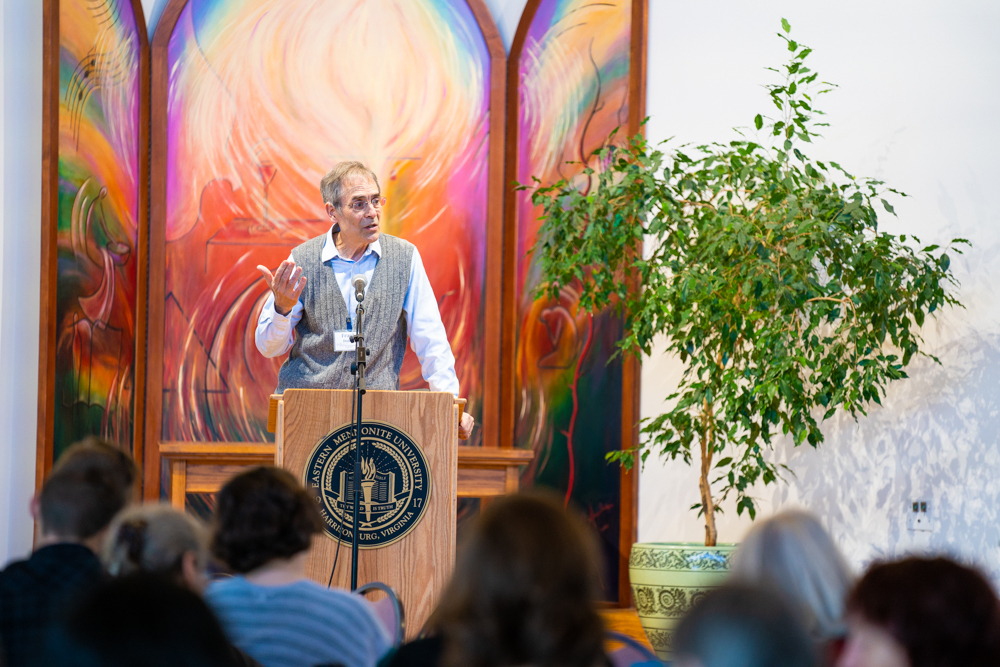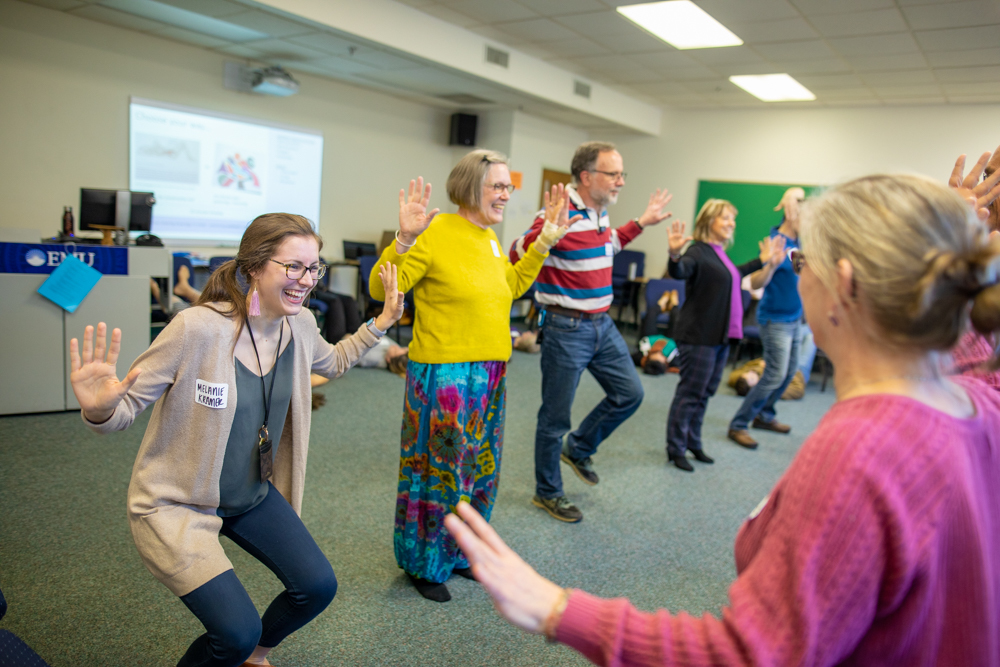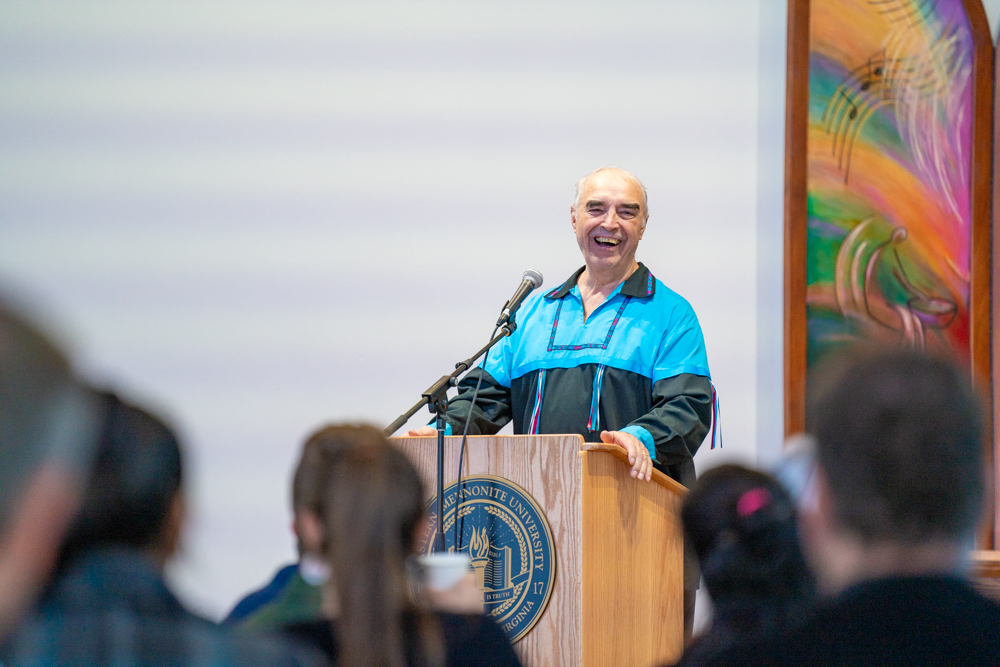“Family means everything to Monacan people,” said the tribe’s chief, Kenneth Branham, during Eastern Mennonite University’s Community Day on Feb. 14. During a noon plenary session, Branham interspersed the history of the Monacan nation with poignant anecdotes in a warm, Tidewater accent about his family, friends, and interactions with neighboring communities.
Branham, also known as “Papaw the Chief” to his grandchildren, was one of two keynote speakers to address approximately 100 attendees. He was joined by Frank Dukes, a professor at the University of Virginia, who was involved in community processing of the new memorial to the enslaved laborers who helped to build the university.
Community Day acts as a glimpse into the Center for Justice and Peacebuilding’s Summer Peacebuilding Institute (SPI). During SPI’s four sessions in May and June, academically credentialed practitioners teach five- and seven-day courses that can be taken for personal skills growth and training or academic credit. Three-day workshops are also offered.
Connecting with Indigenous Virginians
Graduate student Tala Bautista, who introduced Branham, was EMU’s first connection to the Monacan Nation. As a member of the Sumacher First Nation in Kalinga, Philippines, she arrived in Virginia looking for other indigenous voices and made a visit to the Monacans in the fall.
“When we asked the chief what we could do as a response to the stories he shared to us, he said, ‘Tell anyone you meet that we exist,’” Bautista recalled in the recent Crossroads magazine. “In my last year here as a student, I am doing my best to do what he told us.”
The Monacan nation was granted federal recognition in 2018 – a distinction Branham has fought for his entire life. While he noted, tongue-in-cheek, that “you don’t get any checks” with the recognition, it does allow the tribe to apply for education scholarships, assistance from the U.S. Department of Housing and Urban Development, and access to the Indian Health Service.
Federal recognition is in some ways, Branham said, a symbol of pride and security – that Monacans no longer have to hide their heritage.
“I asked my grandmother one time, and she told me with tears in her eyes, she said, son, if someone were to hear us teaching you anything about being Indian, we might not have had a place to live the next day,” Branham recalled. “Everybody should be proud of who they are. And that’s what we’re trying to instill in our young people.”
A long road toward memorializing enslaved laborers

Frank Dukes, distinguished institute fellow at the University of Virginia’s Institute for Engagement & Negotiation, spoke about other efforts to raise awareness about Virginia’s racial history in his plenary address and in a workshop on transforming community spaces. In 2007, Dukes helped to start the University and Community Action for Racial Equity group, which sought stakeholder feedback on how to improve the university’s relationship with the community – including how to acknowledge their history as an institution built by enslaved laborers.
“We have to actually tell a more complete history of the university,” Dukes said. “History can teach, and all of us must be willing to learn.”
After a years-long collaborative process, including input from the descendants that could be found of the 4,000 people who had been enslaved on the campus, the group had a memorial to those laborers designed and built. It is now in the final stages of construction. A public dedication ceremony is planned for April 11.
Community Day participants: What they said

- Laura Sunder-Rao, a third-grade teacher from Elkton, Va.
Sunder-Rao was one of 25 local teachers whose attendance was sponsored by a local donor couple who began funding scholarships last year to introduce local educators to peacebuilding and restorative justice concepts. She attended Professor Kathy Evans’ workshop on circle processes in schools, which was packed with teachers, counselors, and school administrators from around the state.
Sunder-Rao and other teachers peppered Evans with questions about how to improve their circles, especially when students are reluctant to speak or even sit in the circle.
“You can’t rush trust … there’s a reason they’re not invested,” said Evans.
- Marc Jaccard, executive director of the Henry and William Evans Home for Children in Winchester, Va.
Jaccard, who has served at the home since 1995, works with children who are placed in the group home by their parents due to homelessness or other unsafe situations. Currently, there are 12 children at the home, who are looked after collaboratively by their parents and the home staff. The home’s services include “everything from emergency support to an alumni house where they can live and pay rent, receiving the rent back when they leave,” Jaccard said.
“I enjoyed learning about circles in schools, and feel that there is an easy application in our environment here.”
- Kelly Altizer, associate with the UVA Institute for Engagement & Negotiation.
Altizer coordinates the Virginia Natural Resources Leadership Institute and supports other projects through the institute, such as a Governor’s Summit on Equitable Collaboration and a natural resource conservation and economic development project in the Lower Chickahominy watershed. From a workshop on personal formation for peacebuilders, Altizer gleaned “the need to be more thoughtful about how the different facets of my identity contribute to my empowerment or disempowerment in any situation, and how that informs my ability to facilitate change, or to support others in doing so.”
- Cameron Wilson, human resources learning specialist for the city of Roanoke.
Wilson has worked in adult education for over 10 years, and now develops and leads training for the city of Roanoke to ensure “employees have the skills and knowledge necessary to be successful in their work.” A two-time attendee at Community Day, Wilson wants to seek out “opportunities for the City of Roanoke to collaborate more equitably with the community, and I hope to be able to bring a trauma-informed lens to my work with the city by attending a full STAR training in the near future.”
